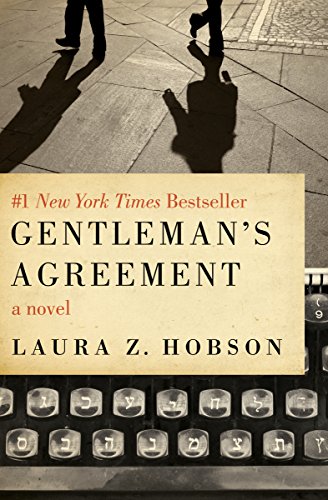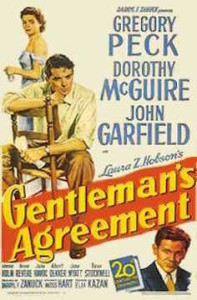Quotes by Laura Z. Hobson on Writing and Humanity
By Skyler Gomez | On June 17, 2017 | Updated October 19, 2022 | Comments (0)

Laura Z. Hobson grew up on Long Island raised by parents who fled czarist Russia. She started her career writing for Time, Life and Fortune magazines until she became a full-time novelist with the publication of Gentlemen’s Agreement, the classic novel of “polite” antisemitism in post-World War II America.
Hobson studied at Cornell University, was a single mother of two sons, and wrote novels based on her life experiences and observations. Here’s a selection of quotes by Laura Z. Hobson, displaying her wisdom on humanity in general and her writing life in particular.
. . . . . . . . . .
“I grew up in an agnostic broad-minded family. I think of myself as a plain human being who happens to be an American.”
. . . . . . . . . .
“The anti-semite offered the effrontery—and then the world was ready with harsh yardsticks to measure the self-control and dignity with which you met it. You were insensitive or too sensitive; you were too timid or too bellicose; they gave you at once the wound and the burden of proper behavior toward it.” (Gentleman’s Agreement, 1947)
. . . . . . . . . .
“Work is hard. Distractions are plentiful. And time is short.”
. . . . . . . . . .
“He was a hoarder of books—he never could bring himself to throw any book away, so one or two of the ones he remembered owning ought to be somewhere in this conglomeration.” (Gentleman’s Agreement, 1947)
. . . . . . . . . .
“I think of myself as a plain human being who happens to be an American.”
. . . . . . . . . .
Gentlemen’s Agreement
. . . . . . . . . .
“I think that, in almost all human beings, there is buried a profound tribal instinct that makes us very susceptible to being aroused to patriotic fervor.”
. . . . . . . . . .
“Confidence, sureness, the freedom from his own ever-questioning-of-himself—she had that, and he envied her as he envied anybody else who was not forever involved with the weighing, the analyzing, the searching out he went through. She would not know the torment there could be in the fluctuating mood, the shifting decision, the wide swing between clarity and confusion, between cheerfulness and depression.” (Gentleman’s Agreement, 1947)
. . . . . . . . . .
“Slow and unarguable, the old desire for love, for a close-shared life, struck at him, not with Kathy, not with Anne, not with any one woman. It was concept only, urgency in the blood.” (Gentleman’s Agreement, 1947)
. . . . . . . . . .
“Someday, I have no doubt, the dead from today’s wars will be seen with a similar sense of sorrow at needless loss and folly as those millions of men who lie in the cemeteries of France and Belgium – and tens of millions of Americans will feel a similar revulsion for the politicians and generals who were so spendthrift with others’ lives.”
. . . . . . . . . .
“Any life he’d ever heard of, his own included, was burdened with emotions – love, loss, jobs, jealousy, money, death, pain. But if you were Jewish, always there was this extra one, the added pull at your endurance, the one more thing. There was that line in Thoreau about ‘quiet desperation’ – that was indeed true of most men. But for some men and women, for some fathers and mothers and children, the world still contrived that one extra test, endless and unrelenting.” (Gentleman’s Agreement, 1947)
. . . . . . . . . .
“I rewrite everything, almost idiotically. I rewrite and work and work, and rewrite and rewrite some more.”
. . . . . . . . . .
Learn more about Laura Z. Hobson
. . . . . . . . . .
“I’ve told youngsters not to write their autobiographical novel at the age of twenty-one; to save it for the time when they’re fifty-one or sixty-one. They should write other novels first, to learn their craft; they shouldn’t cut their teeth on the valuable material of childhood because they’ll never have better material, ever, to work with.”
. . . . . . . . . .
“Why didn’t children ever see that they could damage and harm their parents as much as parents could damage and harm children?”
. . . . . . . . . .
“Writers talk about the agony of writing; I talk about the agony of not writing.”
. . . . . . . . . .
“They had known it, the patient, stubborn men who for years had argued and written and rephrased and fought over the Constitution and the Bill of Rights. They had known that injustice could corrupt the tree. They had known that its fruit could pale and sicken and fall at last to the dark ground of history where other dreams of equality and freedom had rotted.” (Gentleman’s Agreement, 1947)
. . . . . . . . . .
“I’ve often heard it said that to a novelist, nothing is ever lost, that every scrap of his or her past life somehow finds its way to a future use, large or small, in some piece or work, perhaps half a century in the future.”
. . . . . . . . . .
“The Z is for Zametkin, my maiden name, and I have clung to it through all my years, because it held my identity in tact before that Anglo-Saxon married name of Hobson.”
. . . . . . . . . .
Hobson’s most famous book
was made into the even more famous 1947 film
. . . . . . . . . .
Skyler Isabella Gomez is a 2019 SUNY New Paltz graduate with a degree in Public Relations and a minor in Black Studies. Her passions include connecting more with her Latin roots by researching and writing about legendary Latina authors.



Leave a Reply